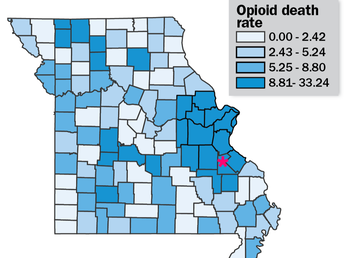Moving Beyond Skepticism: Partnerships to Improve Health Outcomes in St. Francois County, Missouri7/24/2019 An Interview with Amber Elliot, BSN, RN, Assistant Director, St. Francois County Health Center St. Francois County, Missouri was one of two sites selected for year 2 of a pilot program of the CDC (Centers for Disease Control and Prevention), NACCHO (the National Association of County and City Health Officials), and NaRCAD (The National Resource Center for Academic Detailing). This exciting pilot program focused on community-level work with local public health departments to develop customized interventions to reduce opioid overdose and death. Six sites experiencing significant public health problems related to opioids were selected over the two years to be trained in academic detailing; those trained health professionals then conducted 1:1 field visits with front line clinicians to impact behavior around prescribing, treatment referrals, and patient care, all within a rural area. As year 2 comes to a close, we’re showcasing stories from the field. Tags: LOOPR, Opioid Safety, Program Management, Rural AD Programs  Bureau of Vital Statistics, Missouri Department of Health and Senior Services Bureau of Vital Statistics, Missouri Department of Health and Senior Services NaRCAD: Thanks for joining us to talk about academic detailing in St. Francois, Amber. Let’s start the conversation with some background information about your county. How has the opioid crisis presented itself in your community? Amber: As with many other places, St. Francois County has certainly felt the impact from the opioid crisis. We have high rates of overdoses and over-prescribing. There have also been more children in foster homes because their parents have an opioid use disorder, as well as increasing drug arrest rates. Many aspects of our community have been affected in some way or another. I think this is the main reason why so many community agencies have come together to start working on this issue.  NaRCAD: Why did you think the strategy of academic detailing would lend itself to improving patient health in response to the opioid crisis in your community? Amber: Academic detailing is a great strategy to reach out directly to clinicians in their offices in order to provide resources and supportive education without punitive actions. We really weren’t sure what to expect with having two nurse practitioners, two registered nurses, and a pharmacist carrying out the 1:1 detailing visits. Health Center administration and detailers were skeptical of how physicians would react to other disciplines “telling them how to do their job”. However, academic detailing isn’t telling them what to do, it’s talking with them about what they can do to keep their patients safe. It is a partnership. Missouri is the only state without a statewide PDMP. St. Francois County passed an ordinance to join the St. Louis County voluntary PDMP in 2017. The first report from the PDMP showed St. Francois County as the highest prescribing county in the state. This was a big concern for the Local Board of Health and, we learned from community partners, the citizens of St. Francois County. Health Center administration has presented opioid-related health data for the county at various meeting and kept hearing from partners that clinician outreach education and patient education were top priorities when it came to prescription opioids.  NaRCAD: So, it sounds like it’s been a success so far. What would you say has been the most impactful piece of this intervention? Amber: The greatest success of academic detailing in St. Francois County so far has been the willingness of most physicians to start the conversation about how they can improve prescribing patterns, and care of patients at risk for or experiencing opioid use disorder (OUD). Also, many physicians have started using the PDMP regularly as a result of our academic detailing visits. NaRCAD: That’s excellent news and shows the impact that 1:1 education can have! Over the course of this pilot project these past 4 months, what has the greatest challenge been with implementing a successful academic detailing intervention to improve opioid safety in St. Francois? Amber: The challenge are the providers who do not want to talk with the detailers, or the ones who flat out refuse to change their prescribing patterns. As a nurse, this is frustrating to me because I believe in quality, evidence-based healthcare for all. The refusal to learn, or seek to learn, new information about medications that are prescribed daily is poor patient care and our citizens deserve better than that.  NaRCAD: That does sound frustrating! During our 2-day training, we really emphasis the importance of asking open-ended questions to draw clinicians out. However, there will always be some clinicians who will not engage, no matter how great of a detailer you are. Victoria Adewumi from the original cohort of LOOPR detailers discussed that in a prior blog post. What is something you wish you knew prior to joining the LOOPR Academic Detailing project? Amber: I wish I’d known more about choosing detailers. Recruitment is important. When recruiting detailers, it is more important to make sure to recruit people who have the bandwidth to do the detailing, rather than making sure they have the perfect clinical background. It may be a good idea to create a formalized agreement to ensure they completed their required detailing visits. NaRCAD: You are spot on, Amber. Recruitment is a complex process. Readers can learn more about this later in the summer when we release our new Implementation Guide to help sites like yours select and hire the right candidates. Readers can read other LOOPR blog interviews here, and stay plugged in for more LOOPR site highlights in the next couple of months.  Biography Amber Elliot, BSN, RN Assistant Director St. Francois County Health Center Amber Elliott is the Assistant Director for the St. Francois County Health Center in Park Hills, MO. She received her Associates Degree in Nursing in 2008 from Mineral Area College to become a Registered Nurse. She went on to obtain her Bachelor’s Degree in Nursing in 2011 from Central Methodist University. She has spent most of her nursing career working in acute settings, primarily hemodialysis. Amber started working in public health four years ago in hopes to make her own community a healthier, safer place to live. Amber has been working on opioid-related activities since 2017. She currently resides in Farmington, MO with her husband and two children.
1 Comment
12/13/2022 01:57:15 pm
When recruiting detailers, it is more important to make sure to recruit people who have the bandwidth to do the detailing, rather than making sure they have the perfect clinical background. Thank you, amazing post!
Reply
Leave a Reply. |
Highlighting Best PracticesWe highlight what's working in clinical education through interviews, features, event recaps, and guest blogs, offering clinical educators the chance to share successes and lessons learned from around the country & beyond. Search Archives
|
